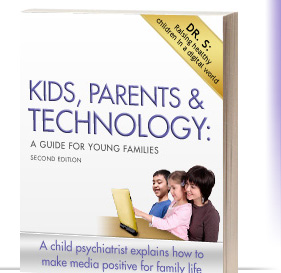Summers at home or on the road have always presented families with special challenges. Today’s technology seems to offer parents great solutions at home or during long car or airplane trips: bored and annoying children turn magically into ‘seen but not heard’ angels as they settle down and remain occupied for long periods, quietly consuming media.
But many parents are not entirely comfortable and many even feel a bit guilty: ‘After all, this IS summer and a FAMILY vacation meant to bring us together and closer.’ Parents are lost: ‘How much media is OK? At what ages? Allow my eleven-year old to take her cell phone? Take lots of DVD movies for the back seat player? How much time for the iPod music player? How much texting?’
“Parents usually have good instincts. Many know that technology consumption is, at best, a mixed blessing,” according to Dr. S, a distinguished Chicago child psychiatrist and author. “Technology use usually isolates family members. Recent polls show how drastically and rapidly technology’s growing seduction is changing how children spend their time year-round, with 1/5 exposed as much as 132 hours weekly. Growing up with ubiquitous electronic input is harming imagination and creativity and leaving kids shallow, unable to self-sooth, stimulus hungry, and easily bored. With summer here, under-supervised school-free kids will now have even more exposure to junk media and will surely consume it as eagerly as they do junk food.”
Here are some tips to help families succeed ‘in the good ol’ cybertime’.
1. The best approach is to already have in place a working home media plan and merely adapt it for the vacation schedule, according to Dr. S’ KIDS, PARENTS & TECHNOLOGY: A GUIDE FOR YOUNG FAMILIES(ISBN 9780557194827). Even reading this book before the vacation will orient parents to what they can do. According to Dr. S, “planning children’s (and parents’) media consumption has to become a priority as important as planning nutrition and education – and on vacation, itinerary, sights, and accommodations — and I hope that smart parents are beginning to catch on.”
2. Use summer travel to put your new plan into operation. During the vacation planning stage, media-soaked kids nag about taking along electronic devices. Collaborate with them, but be firm about stopping their nagging. Whenever possible, plan family trips together online and invent other joint activities like setting up digital photo albums or online educational projects like studying the history of points of interest and travel destinations, or starting collections like postcards, rocks, or sea shells. Prepare together (online?) and bring appropriate materials.
3. Be realistic. As everyday routines give way to large chunks of unstructured time, parents have always had to work hard to occupy bored and listless kids. These days, especially, while we all imagine relaxing during a languid ‘good ol’ summertime’, decompressing from tightly scheduled fast-paced daily lives is not instantaneous and can often cause the ‘bends’ – stresses that lead to many difficult moments for both kids and parents. Kids (and parents, too) who have been over-scheduled and immersed in media year-round, ‘addicted’ to instantly communicating in text with friends, may find themselves lost without electronics, irritable, sullen and unhappy during time with their families. When tensions arise, be patient and think through a solution rather than merely putting technology in kids’ hands.
4. Plan vacation time to enrich kids’ lives (and yours, too.) Work hard to replace electronic clutter and teach kids appreciation of their inner lives and the value of being fully present during quiet private alone time. Encourage thinking, observing, good conversation, collaboration, discovery, and imagination. Teach quiet times together and silently appreciate beautiful natural scenes, art, performances, or music. Parents too cannot possibly have too much of these experiences.
5. You can plan an extreme makeover and ‘cold turkey’ eliminate all electronics or agree ahead of time about a preset schedule of use – for example, one hour a day of smartphone use or limited TV watching. It is best if parents adhere to the same rules to set examples– there is strength in numbers but everybody must sign on. All family members can sign a written ‘contract’ to emphasize the seriousness of your commitments, and post it wherever you can.
6. Discourage excessive isolating activities. Vacations put people — including kids– into unfamiliar proximaties, and folks differ in how much personal distance they need to be comfortable with one another. People do need to get out of each other’s hair, and time out alone — recognize this need and allow it in your kids too. Time alone must be balanced with time together. Privacy from others absorbed with an electronic device can sometimes bring welcome relief from tension. But there may be other ways that are healthier, like taking a walk, reading, or other solitary activities that enrich the senses and imagination.
7. HAVE FUN TOGETHER. Remember – this is the kids’ vacation too. Use media for family activities only – listening to music, play video games, watching TV together. Substitute family games, singing together, reading to each other, conversations, and other fun engagements with kids for isolating earphone music back seat video.
“Media experiences are changing how kids’ brains are wired. Parents should not miss opportunities that summertime brings to cement family life and prevent bad outcomes. There is plenty that is positive and helpful parents can actually do, once they gain the confidence and adopt a new mind set,” according to Dr. S.



TIPS FOR EASING FAMILY SUMMER VACATION TECH STRESS
Summers at home or on the road have always presented families with special challenges. Today’s technology seems to offer parents great solutions at home or during long car or airplane trips: bored and annoying children turn magically into ‘seen but not heard’ angels as they settle down and remain occupied for long periods, quietly consuming media.
But many parents are not entirely comfortable and many even feel a bit guilty: ‘After all, this IS summer and a FAMILY vacation meant to bring us together and closer.’ Parents are lost: ‘How much media is OK? At what ages? Allow my eleven-year old to take her cell phone? Take lots of DVD movies for the back seat player? How much time for the iPod music player? How much texting?’
“Parents usually have good instincts. Many know that technology consumption is, at best, a mixed blessing,” according to Dr. S, a distinguished Chicago child psychiatrist and author. “Technology use usually isolates family members. Recent polls show how drastically and rapidly technology’s growing seduction is changing how children spend their time year-round, with 1/5 exposed as much as 132 hours weekly. Growing up with ubiquitous electronic input is harming imagination and creativity and leaving kids shallow, unable to self-sooth, stimulus hungry, and easily bored. With summer here, under-supervised school-free kids will now have even more exposure to junk media and will surely consume it as eagerly as they do junk food.”
Here are some tips to help families succeed ‘in the good ol’ cybertime’.
1. The best approach is to already have in place a working home media plan and merely adapt it for the vacation schedule, according to Dr. S’ KIDS, PARENTS & TECHNOLOGY: A GUIDE FOR YOUNG FAMILIES(ISBN 9780557194827). Even reading this book before the vacation will orient parents to what they can do. According to Dr. S, “planning children’s (and parents’) media consumption has to become a priority as important as planning nutrition and education – and on vacation, itinerary, sights, and accommodations — and I hope that smart parents are beginning to catch on.”
2. Use summer travel to put your new plan into operation. During the vacation planning stage, media-soaked kids nag about taking along electronic devices. Collaborate with them, but be firm about stopping their nagging. Whenever possible, plan family trips together online and invent other joint activities like setting up digital photo albums or online educational projects like studying the history of points of interest and travel destinations, or starting collections like postcards, rocks, or sea shells. Prepare together (online?) and bring appropriate materials.
3. Be realistic. As everyday routines give way to large chunks of unstructured time, parents have always had to work hard to occupy bored and listless kids. These days, especially, while we all imagine relaxing during a languid ‘good ol’ summertime’, decompressing from tightly scheduled fast-paced daily lives is not instantaneous and can often cause the ‘bends’ – stresses that lead to many difficult moments for both kids and parents. Kids (and parents, too) who have been over-scheduled and immersed in media year-round, ‘addicted’ to instantly communicating in text with friends, may find themselves lost without electronics, irritable, sullen and unhappy during time with their families. When tensions arise, be patient and think through a solution rather than merely putting technology in kids’ hands.
4. Plan vacation time to enrich kids’ lives (and yours, too.) Work hard to replace electronic clutter and teach kids appreciation of their inner lives and the value of being fully present during quiet private alone time. Encourage thinking, observing, good conversation, collaboration, discovery, and imagination. Teach quiet times together and silently appreciate beautiful natural scenes, art, performances, or music. Parents too cannot possibly have too much of these experiences.
5. You can plan an extreme makeover and ‘cold turkey’ eliminate all electronics or agree ahead of time about a preset schedule of use – for example, one hour a day of smartphone use or limited TV watching. It is best if parents adhere to the same rules to set examples– there is strength in numbers but everybody must sign on. All family members can sign a written ‘contract’ to emphasize the seriousness of your commitments, and post it wherever you can.
6. Discourage excessive isolating activities. Vacations put people — including kids– into unfamiliar proximaties, and folks differ in how much personal distance they need to be comfortable with one another. People do need to get out of each other’s hair, and time out alone — recognize this need and allow it in your kids too. Time alone must be balanced with time together. Privacy from others absorbed with an electronic device can sometimes bring welcome relief from tension. But there may be other ways that are healthier, like taking a walk, reading, or other solitary activities that enrich the senses and imagination.
7. HAVE FUN TOGETHER. Remember – this is the kids’ vacation too. Use media for family activities only – listening to music, play video games, watching TV together. Substitute family games, singing together, reading to each other, conversations, and other fun engagements with kids for isolating earphone music back seat video.
“Media experiences are changing how kids’ brains are wired. Parents should not miss opportunities that summertime brings to cement family life and prevent bad outcomes. There is plenty that is positive and helpful parents can actually do, once they gain the confidence and adopt a new mind set,” according to Dr. S.